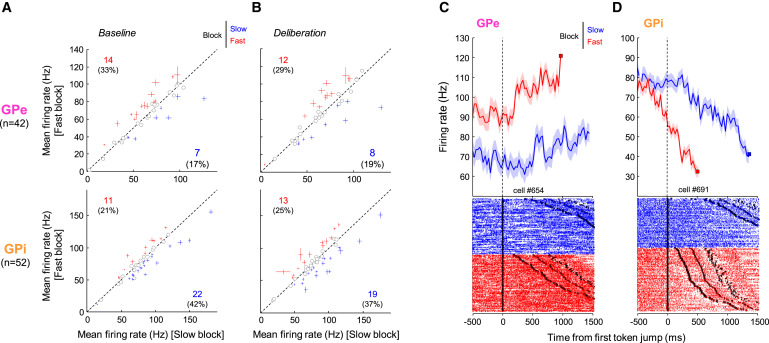Our official English website, www.x-mol.net, welcomes your feedback! (Note: you will need to create a separate account there.)
The Basal Ganglia Do Not Select Reach Targets but Control the Urgency of Commitment.
Neuron ( IF 16.2 ) Pub Date : 2017-Aug-30 , DOI: 10.1016/j.neuron.2017.07.039 David Thura , Paul Cisek
Neuron ( IF 16.2 ) Pub Date : 2017-Aug-30 , DOI: 10.1016/j.neuron.2017.07.039 David Thura , Paul Cisek

|
Prominent theories of decision making suggest that the basal ganglia (BG) play a causal role in deliberation between action choices. An alternative hypothesis is that deliberation occurs in cortical regions, while the BG control the speed-accuracy trade-off (SAT) between committing to a choice versus continuing to deliberate. Here, we test these hypotheses by recording activity in the internal and external segments of the globus pallidus (GPi/GPe) while monkeys perform a task dissociating the process of deliberation, the moment of commitment, and adjustment of the SAT. Our data suggest that unlike premotor and motor cortical regions, pallidal output does not contribute to the process of deliberation but instead provides a time-varying signal that controls the SAT and reflects the growing urgency to commit to a choice. Once a target is selected by cortical regions, GP activity confirms commitment to the decision and invigorates the subsequent movement.
中文翻译:

基底神经节不选择达成目标,而是控制承诺的紧迫性。
杰出的决策理论表明,基底神经节(BG)在行动选择之间的思考中起着因果作用。另一种假设是,审议发生在皮质区域,而BG控制在做出选择与继续进行讨论之间的速度精度权衡(SAT)。在这里,我们通过记录苍白球(GPi / GPe)的内部和外部部分中的活动来测试这些假设,而猴子则执行了将审议过程,承诺时间和SAT调整分离的任务。我们的数据表明,与运动前和运动皮层区域不同,苍白细胞的输出不参与深思熟虑的过程,而是提供随时间变化的信号来控制SAT并反映出不断做出选择的紧迫性。
更新日期:2017-08-31
中文翻译:

基底神经节不选择达成目标,而是控制承诺的紧迫性。
杰出的决策理论表明,基底神经节(BG)在行动选择之间的思考中起着因果作用。另一种假设是,审议发生在皮质区域,而BG控制在做出选择与继续进行讨论之间的速度精度权衡(SAT)。在这里,我们通过记录苍白球(GPi / GPe)的内部和外部部分中的活动来测试这些假设,而猴子则执行了将审议过程,承诺时间和SAT调整分离的任务。我们的数据表明,与运动前和运动皮层区域不同,苍白细胞的输出不参与深思熟虑的过程,而是提供随时间变化的信号来控制SAT并反映出不断做出选择的紧迫性。


























 京公网安备 11010802027423号
京公网安备 11010802027423号